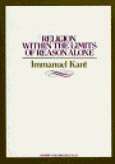ts
Immanuel Kant

Though the title may imply so, Religion Within the Limits of Reason Alone is not an attempt to confine religion to reason per se, but rather an attempt to display what can be perceived by reason on the subject of reason, naturally of Kant, a priori (outside of experience). When Kant encountered a topic that was outside the limits of reason (i.e. miracles) he fully conceded that reason could not explain that which is of direct Divine influence, thus making his point clear that reason can be useful within religion, but there comes a point where God takes over and reason must bow before His Sovereignty. This book contains a wealth of interesting ideas and concepts. However, due to Kant's deeply profound writing style, this book, along with his others, is generally misunderstood, or else not understood at all. As a Christian witness, Kant made many beautiful comments on the necessity of being "Born-again" through the Son of God and on the Law of God and its influence on the sinner who is incapable of being righteous outside of this law.
Schleiermacher: On Religion:
Speeches to its Cultured Despisers
Friedrich SchleiermacherBook Description:
Schleiermacher's On Religion: Speeches to its Cultured Despisers is a classic of modern Protestant religious thought that powerfully displays the tensions between the Romantic and Enlightenment accounts of religion. This edition presents the original 1799 text in English for the first time. Richard Crouter's introduction places the work in the milieu of early German Romanticism, Kant criticism, the revival of Spinoza and Plato studies, and theories of literary criticism and of the physical sciences. This fully annotated edition also contains a chronology and notes on further reading.
Ingram:
On religion is a text that has more than historical interest. The "speeches" themselves provide a compelling defense of religion as an essential component in the lives of intellectually vital, cultured person. Religion, according to Schleiemacher, is the noblest ingredient of an authentic humanity. --This text refers to the Paperback edition.
Dogmatics in Outline
Karl BarthA wonderful way to delve into what a Christian confesses in the Apostle's Creed. Do you find yourself having repeated the confession without remembering that you have? You won't again. Barth parses the Creed, explaining each phrase within the totality of traditional church teaching as well as reflective of the condition and history of twentieth century man. It is mindful of the historical position of individual contemporary Christians looking backward and forward at their role in salvation history. It is not a casual read, but well worth the theological effort.
Being and Time
Martin HeideggerEditorial ReviewsAmazon.com
Martin Heidegger paved the road trod on by the existentialists with the 1927 publication of Being and Time. His encyclopedic knowledge of philosophy from ancient to modern times led him to rethink the most basic concepts underlying our thinking about ourselves. Emphasizing the "sense of being" (dasein) over other interpretations of conscious existence, he argued that specific and concrete ideas form the bases of our perceptions, and that thinking about abstractions leads to confusion at best. Thus, for example, "time" is only meaningful as it is experienced: the time it takes to drive to work, eat lunch, or read a book is real to us; the concept of "time" is not.
Unfortunately, his writing is difficult to follow, even for the dedicated student. Heidegger is best read in German: his neologisms and other wordplay strain the talents of even the best translators. Still, his thoughts about authentic being and his turning the philosophical ground inspired many of the greatest thinkers of the mid 20th century, from Sartre to Derrida. Unfortunately, political and other considerations forced Heidegger to leave Being and Time unfinished; we can only wonder what might have been otherwise. --Rob Lightner